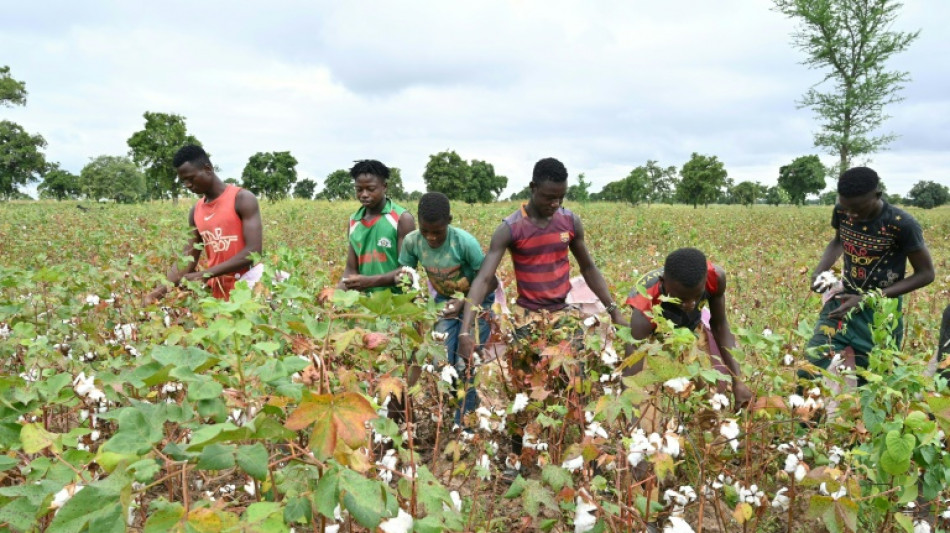
-
 Munsey leads Scotland to 207-4 against Italy at T20 World Cup
Munsey leads Scotland to 207-4 against Italy at T20 World Cup
-
Japan restarts world's biggest nuclear plant again

-
 Bangladesh poll rivals rally on final day of campaign
Bangladesh poll rivals rally on final day of campaign
-
Third impeachment case filed against Philippine VP Duterte

-
 Wallaby winger Nawaqanitawase heads to Japan
Wallaby winger Nawaqanitawase heads to Japan
-
Thailand's Anutin rides wave of nationalism to election victory

-
 Venezuela's Machado says ally kidnapped by armed men after his release
Venezuela's Machado says ally kidnapped by armed men after his release
-
Maye longs for do-over as record Super Bowl bid ends in misery

-
 Seahawks' Walker rushes to Super Bowl MVP honors
Seahawks' Walker rushes to Super Bowl MVP honors
-
Darnold basks in 'special journey' to Super Bowl glory

-
 Japan's Takaichi may struggle to soothe voters and markets
Japan's Takaichi may struggle to soothe voters and markets
-
Seahawks soar to Super Bowl win over Patriots

-
 'Want to go home': Indonesian crew abandoned off Africa demand wages
'Want to go home': Indonesian crew abandoned off Africa demand wages
-
Asian stocks track Wall St rally as Tokyo hits record on Takaichi win

-
 Bad Bunny celebrates Puerto Rico in joyous Super Bowl halftime show
Bad Bunny celebrates Puerto Rico in joyous Super Bowl halftime show
-
Three prominent opposition figures released in Venezuela

-
 Israeli president says 'we shall overcome this evil' at Bondi Beach
Israeli president says 'we shall overcome this evil' at Bondi Beach
-
'Flood' of disinformation ahead of Bangladesh election

-
 Arguments to begin in key US social media addiction trial
Arguments to begin in key US social media addiction trial
-
Agronomics Limited Announces Net Asset Value Calculation as at 31 December 2025

-
 UK-Based Vesalic Limited Emerges from Stealth with Landmark Discovery of Potential Non-CNS Driver of Motor Neuron Diseases, including ALS, and Breakthrough Therapeutic and Diagnostic Opportunities
UK-Based Vesalic Limited Emerges from Stealth with Landmark Discovery of Potential Non-CNS Driver of Motor Neuron Diseases, including ALS, and Breakthrough Therapeutic and Diagnostic Opportunities
-
Gotterup tops Matsuyama in playoff to win Phoenix Open

-
 New Zealand's Christchurch mosque killer appeals conviction
New Zealand's Christchurch mosque killer appeals conviction
-
Leonard's 41 leads Clippers over T-Wolves, Knicks cruise

-
 Trump says China's Xi to visit US 'toward the end of the year'
Trump says China's Xi to visit US 'toward the end of the year'
-
Real Madrid edge Valencia to stay on Barca's tail, Atletico slump

-
 Malinin keeps USA golden in Olympic figure skating team event
Malinin keeps USA golden in Olympic figure skating team event
-
Lebanon building collapse toll rises to 9: civil defence

-
 Real Madrid keep pressure on Barca with tight win at Valencia
Real Madrid keep pressure on Barca with tight win at Valencia
-
PSG trounce Marseille to move back top of Ligue 1

-
 Hong Kong to sentence media mogul Jimmy Lai in national security trial
Hong Kong to sentence media mogul Jimmy Lai in national security trial
-
Lillard will try to match record with third NBA 3-Point title

-
 Vonn breaks leg as crashes out in brutal end to Olympic dream
Vonn breaks leg as crashes out in brutal end to Olympic dream
-
Malinin enters the fray as Japan lead USA in Olympics team skating

-
 Thailand's Anutin readies for coalition talks after election win
Thailand's Anutin readies for coalition talks after election win
-
Fans arrive for Patriots-Seahawks Super Bowl as politics swirl

-
 'Send Help' repeats as N.America box office champ
'Send Help' repeats as N.America box office champ
-
Japan close gap on USA in Winter Olympics team skating event

-
 Liverpool improvement not reflected in results, says Slot
Liverpool improvement not reflected in results, says Slot
-
Japan PM Takaichi basks in election triumph

-
 Machado's close ally released in Venezuela
Machado's close ally released in Venezuela
-
Dimarco helps Inter to eight-point lead in Serie A

-
 Man City 'needed' to beat Liverpool to keep title race alive: Silva
Man City 'needed' to beat Liverpool to keep title race alive: Silva
-
Czech snowboarder Maderova lands shock Olympic parallel giant slalom win

-
 Man City fight back to end Anfield hoodoo and reel in Arsenal
Man City fight back to end Anfield hoodoo and reel in Arsenal
-
Diaz treble helps Bayern crush Hoffenheim and go six clear

-
 US astronaut to take her 3-year-old's cuddly rabbit into space
US astronaut to take her 3-year-old's cuddly rabbit into space
-
Israeli president to honour Bondi Beach attack victims on Australia visit

-
 Apologetic Turkish center Sengun replaces Shai as NBA All-Star
Apologetic Turkish center Sengun replaces Shai as NBA All-Star
-
Romania, Argentina leaders invited to Trump 'Board of Peace' meeting


France plans fashion revolution with climate-impact labels
Is it better for the environment if you buy a brand-new cotton T-shirt or a recycled one?
Well, it depends.
Recycling has obvious benefits, but the process shortens cotton fibres and so usually has to be mixed with some oil-based material to keep it from falling apart.
Such trade-offs make it tricky to figure out the real sustainability rating of clothes -- but brands in Europe will soon have no choice.
By next year, every item of clothing sold in France will require a label detailing its precise climate impact -- with a similar rule expected for the rest of the European Union by 2026.
That means juggling many different and conflicting data points: Where and how were its raw materials grown? What was used to colour it? How far did it travel? Was the factory powered with solar energy or coal?
The French Agency for Ecological Transition (Ademe) is currently testing 11 proposals for how to collect and compare data -- and what the resulting label might look like to consumers -- using 500 real-life items of clothing.
"The message of the law is clear -- it will become obligatory, so brands need to prepare, to make their products traceable, to organise the automatic collection of data," Erwan Autret, one of the coordinators at Ademe, told AFP.
"Some say the models are too simple, some say they're too complicated, but it's a sign of the maturity of the debate that no one questions the need for these calculations anymore."
- 'Transparent and informed' -
The need for change in fashion is urgent.
Statistics are notoriously hard to verify, but the UN says the industry is responsible for 10 percent of global carbon emissions, as well as a significant portion of water consumption and waste.
Labels can be a key part of the solution, say campaigners.
"It will force brands to be more transparent and informed... to collect data and create long-term relationships with their suppliers -- all things they're not used to doing," said Victoire Sotto, of The Good Goods, a fashion and sustainability consultancy.
"Right now it seems infinitely complex," she added. "But we've seen it applied in other industries such as medical supplies."
Seeing how the winds are blowing, the textile industry has been racing to come up with technical solutions.
A recent presentation by Premiere Vision, a Paris-based textiles conference, highlighted many new processes including non-toxic leather tanning, dyes drawn from fruits and waste -- and even biodegradable underwear that can be thrown on the compost.
But the key to sustainability is using the right fabric for the right garment, said Ariane Bigot, Premiere Vision's deputy head of fashion.
That means synthetic and oil-based fabrics will still have a place, she said: "A strong synthetic with a very long lifespan might be right for some uses, such as an over-garment that needs little washing."
Capturing all these trade-offs in one simple label on an item of clothing is therefore tricky.
"It's very complicated," said Bigot. "But we need to get the machine started."
- Sustainable options -
The French agency is due to collate the results of its testing phase by next spring before handing the results to lawmakers.
While many welcome the labels, activists say this should only be part of a wider crackdown on the fashion industry.
"It's really good to put an emphasis on life-cycle analysis but we need to do something about it beyond just labels," said Valeria Botta, of the Environmental Coalition on Standards.
"The focus should be on setting clear rules on product design to ban the worst products from the market, ban the destruction of returned and unsold goods, and set production limits," she told AFP.
"Consumers should not have to fight to find a sustainable option -- that should be the default."
F.Pedersen--AMWN

